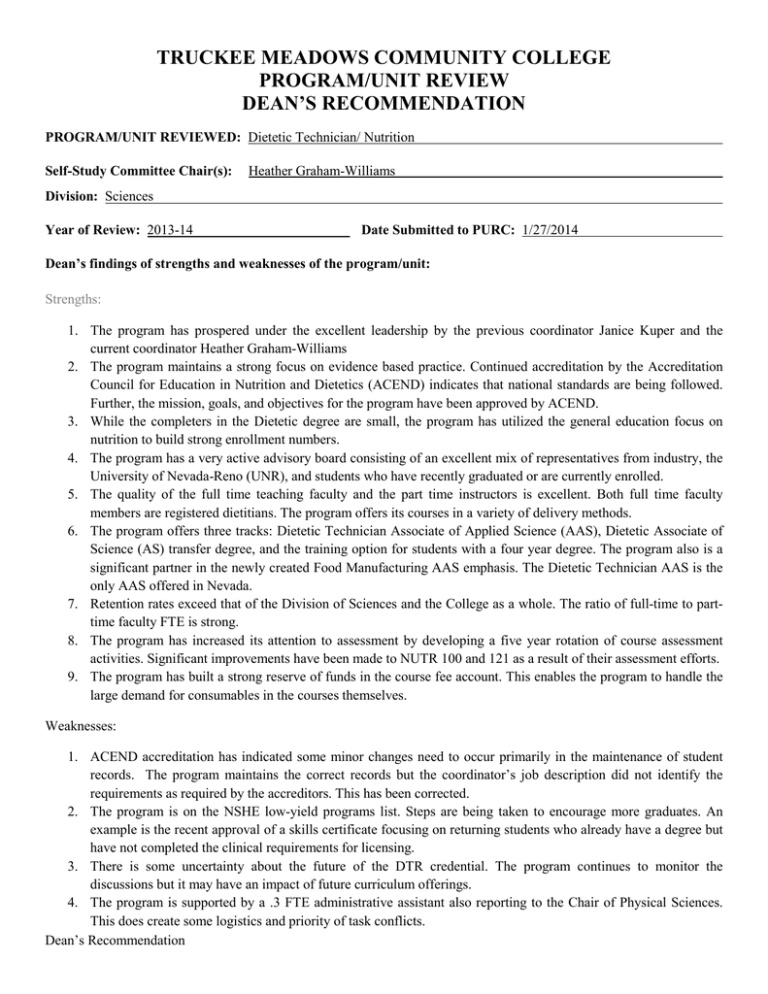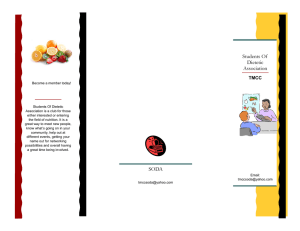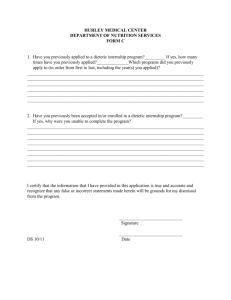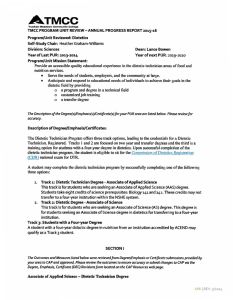TRUCKEE MEADOWS COMMUNITY COLLEGE PROGRAM/UNIT REVIEW DEAN’S RECOMMENDATION
advertisement

TRUCKEE MEADOWS COMMUNITY COLLEGE PROGRAM/UNIT REVIEW DEAN’S RECOMMENDATION PROGRAM/UNIT REVIEWED: Dietetic Technician/ Nutrition Self-Study Committee Chair(s): Heather Graham-Williams Division: Sciences Year of Review: 2013-14 Date Submitted to PURC: 1/27/2014 Dean’s findings of strengths and weaknesses of the program/unit: Strengths: 1. The program has prospered under the excellent leadership by the previous coordinator Janice Kuper and the current coordinator Heather Graham-Williams 2. The program maintains a strong focus on evidence based practice. Continued accreditation by the Accreditation Council for Education in Nutrition and Dietetics (ACEND) indicates that national standards are being followed. Further, the mission, goals, and objectives for the program have been approved by ACEND. 3. While the completers in the Dietetic degree are small, the program has utilized the general education focus on nutrition to build strong enrollment numbers. 4. The program has a very active advisory board consisting of an excellent mix of representatives from industry, the University of Nevada-Reno (UNR), and students who have recently graduated or are currently enrolled. 5. The quality of the full time teaching faculty and the part time instructors is excellent. Both full time faculty members are registered dietitians. The program offers its courses in a variety of delivery methods. 6. The program offers three tracks: Dietetic Technician Associate of Applied Science (AAS), Dietetic Associate of Science (AS) transfer degree, and the training option for students with a four year degree. The program also is a significant partner in the newly created Food Manufacturing AAS emphasis. The Dietetic Technician AAS is the only AAS offered in Nevada. 7. Retention rates exceed that of the Division of Sciences and the College as a whole. The ratio of full-time to parttime faculty FTE is strong. 8. The program has increased its attention to assessment by developing a five year rotation of course assessment activities. Significant improvements have been made to NUTR 100 and 121 as a result of their assessment efforts. 9. The program has built a strong reserve of funds in the course fee account. This enables the program to handle the large demand for consumables in the courses themselves. Weaknesses: 1. ACEND accreditation has indicated some minor changes need to occur primarily in the maintenance of student records. The program maintains the correct records but the coordinator’s job description did not identify the requirements as required by the accreditors. This has been corrected. 2. The program is on the NSHE low-yield programs list. Steps are being taken to encourage more graduates. An example is the recent approval of a skills certificate focusing on returning students who already have a degree but have not completed the clinical requirements for licensing. 3. There is some uncertainty about the future of the DTR credential. The program continues to monitor the discussions but it may have an impact of future curriculum offerings. 4. The program is supported by a .3 FTE administrative assistant also reporting to the Chair of Physical Sciences. This does create some logistics and priority of task conflicts. Dean’s Recommendation 5. The discipline shares classroom lab space with other programs. This creates storage and access problems. Summary action recommended for program/unit: Continue Recommendations for development strategies and anticipated time lines: I concur with the PUR Committee’s recommendations on the following strategies: Curriculum: • • • Continue degree and course assessment efforts. Work with advising to ensure reverse transfer to increase the number of graduates. Monitor the impact of the creation of the new Dietetic Tech Skills Certificate. Demographics and Enrollment: • • • Work with Admissions and Records to identify students with enough credits to graduate but have not applied for graduation. Monitor ACEND requirements as they develop for the Master of Science level requirements for DTR’s – The program received a notice of full reaccreditation on March 14, 2014. Consider possibilities of increase faculty interaction with advising. Resources: • • • • Undertake steps to increase the size of the part-time instructor pool. Consider additional strategies to expand the program (e.g., Food Manufacturing) to help increase enrollments. Seek grant and external funding sources to help the program grow. Consider employing an increased marketing effort with the Washoe County School District and/or TMCC High School to encourage more interest in the program. – The program began offering Nutrition 121 to TMCC High School sophomores in the fall of 2013 and plan to do so again in Fall 2014. This course meets the high school science requirement. All timelines are considered ongoing unless otherwise noted: Identify resources necessary for implementation of recommended development strategies: The above recommended strategies do not require additional funding sources. They do, however, require some additional effort and time from the coordinator of the program. The Dean will work with the program coordinator to align priorities to ensure that her time is not adversely affected by these new projects. Describe impact of recommended development strategies on Division planning: A strong Dietetic Tech and Nutritional course offerings ensures that the division continues to meet its goal of providing general education science to the TMCC student body. These courses also count double in the new funding formula which makes growth in the program desirable for the college. Describe impact of recommended development strategies on program/unit faculty: I do not see any negative impact on program faculty. In fact, a stronger program enhances the faculty experience and standing within the college. Oean of Enter Division Name: Name Date Ted Plaggemeyer 3/14120 14 Dean's Recommendation


